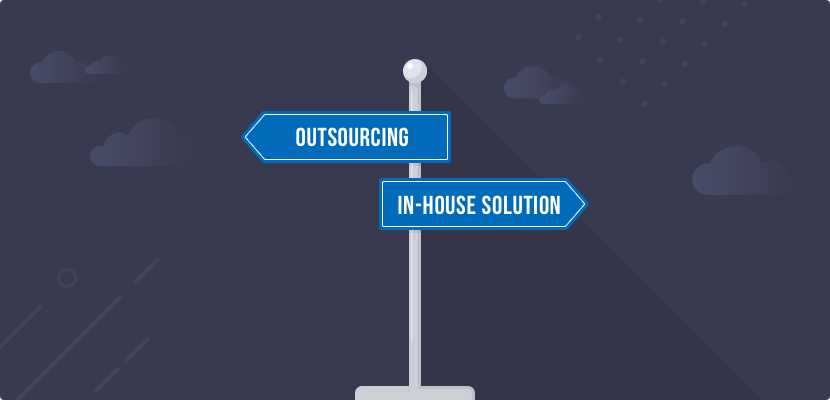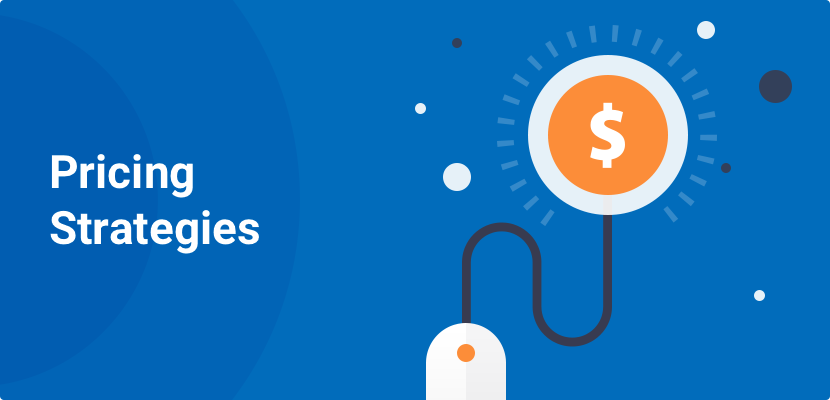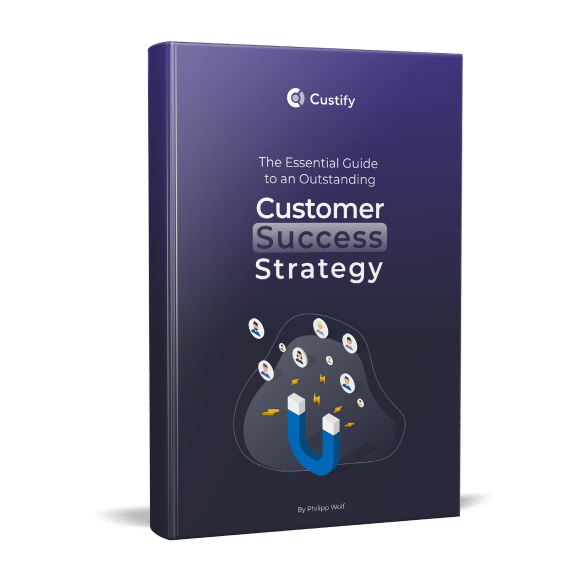
Many customer-facing business functions get outsourced on a regular basis. Outsourced customer support is extremely common, technical teams are often used on a contract basis, and even sales gets accomplished by outside teams.
But should you outsource your customer success operations? It’s a difficult question. If you’ve outsourced other customer-facing parts of your business, you might be tempted to answer “yes” right away.
The decision, however, is more complicated than you might realize. We’ll take a look at a few advantages and disadvantages of outsourcing customer success, then come to a recommendation that you can apply to your own business.
Let’s start with one of the most obvious things you’ll need to keep in mind.
Customer Success Software Helps You Build Relationships
Unlike many account managers or customer service reps, customer success managers (CSMs) are all about building long-term relationships. In addition to having detailed knowledge about their own product or service, customer success reps also understand their clients’ businesses, roles in the marketplace, long-term goals, and potential problems.
This relationship is often similar to one between a consultant and a client. The CSM will be familiar enough with the customer to be able to make significant recommendations on how they should proceed in their business. That’s a very close relationship.
As you might imagine, developing this relationship with customers takes time. Customer success professionals might have regular check-ins with their clients starting during the implementation phase and continuing all the way through expansion and renewal.
For this reason among others, CSMs often have relatively small client loads compared to professionals in similar jobs. They work closely with a small group of people to become ingrained in their customers’ companies so they can help them succeed.
These factors point to the fact that outsourcing customer success isn’t easy. Customer service outsourcing companies are more likely to have larger client loads, a shallower understanding of your product or service, and less commitment to seeing your clients maximize their returns.
Internal employees are always going to be better at building long-term relationships with customers. This is an argument for keeping customer success professionals onboard for a long time, too—the more rapport they have with clients, the more valuable they are, both to you and your customers.
Business relationships aren’t built quickly. It takes time, trust, a lot of interactions, and proven value. None of those things are going to be easy to get with an outsourced customer success team. Other kinds of outsourced teams can get away with this. Customer success can’t.
Customer Success Requires Extensive Knowledge
Outsourced sales teams can develop a solid base of knowledge about your products and services. But their knowledge is very focused: it’s on features and benefits. It might include your position in the market among your competitors.
But that’s the extent of it.
Customer success requires a lot more knowledge than that. CSMs need to have at least cursory knowledge of implementation, onboarding, training, product use, expansion, and more. They’re sometimes involved in cross-selling and upselling as well. They might be expected to be on hand when customer need support.
They aren’t necessarily experts in any of these areas—your company still needs to have an implementation team, tech support, and so on. But your customer success team is the front line for almost every interaction with a customer.
And doing that successfully requires a huge amount of knowledge.
In an era where professionals are increasingly siloed into highly specific roles, the customer success manager still needs to be a well-rounded employee that prioritizes customer success. It takes a highly adaptable employee to make a good CSM. You can certainly provide customer success training that will help, but in the end, the person needs to be well-suited to the job.
The CSM’s knowledge doesn’t end with your own company, product, or service, though. They also need to really understand the problems your customers are trying to solve, how they plan to grow, where they are in the marketplace, how their employees use the product or service, and so on.
A customer success agent acts almost as an extension of the client company. And gaining enough knowledge to do that takes time and a solid relationship. There’s just no way that an outsourced customer success team can do that.
They’ll be trying to develop knowledge about multiple customers at several different companies, and there’s no way to learn and adapt quickly enough for it to be effective.
Customer Success Professionals Need to Be Decision-Makers
Because they’re on the front lines of your company and addressing the needs of your customers, your customer success team needs to be able to make high-level decisions and act on them quickly.
They might be given the authority to offer special deals for renewal, provide non-traditional customer support services, or make promises related to onboarding or expansion. While you could give this authority to an outsourced team, you’d be better off assigning these responsibilities to someone who’s proven themselves in your company.
Effective decision-making also requires an understanding of your company’s capabilities and workload. If an outsourced customer success professional makes a promise that you can’t keep because of previous commitments or obligations, your customer isn’t going to be happy.
Giving someone decision-making power isn’t going to end well unless they’re deeply embedded within your company. You hire people because you trust them—and that trust is essential in a customer success program.
Customer Success Software Ensures Cultural Fit
Businesses are increasingly recognizing the importance of cultural fit for employees. If an employee understands and supports the values, mission, and overall “feel” of a company, they’ll be much more effective in doing their job. They’ll have a large positive impact on the company, and they’ll help others do their best as well.
Implementing a customer success program at your business requires a cultural shift. The company is no longer just focused on increasing the bottom line. Instead, emphasis is placed on creating a product or service that helps customers increase their bottom line. The difference might seem subtle, but it results in very different business decisions.
Customer success managers need to have a clear understanding of this cultural paradigm. And not only that—they also have to be able to adapt to the culture of the customers that they serve. Because they’re in a consultative position, they’re embedded within the company using your product or service. A good cultural fit will help them assist the company even further.
Outsourced customer success professionals are at a further remove from the culture of your company and that of your customers. You have no say in the hiring of the agents, and can’t take cultural issues into account when choosing who will be involved in the customer success program.
Assessing cultural fit is already difficult. Throwing outsourcing into the mix isn’t going to help. And while it might not seem like emphasizing corporate culture is going to help you run a better customer success program, the effects are clear in the long run.
Lifetime Value Is Key For Customer Success
Modern businesses, especially in the SaaS field, monitor a huge number of metrics. Churn, onboarding, and recurring revenue figures fly about—but lifetime value is the ultimate measure of how well your company is onboarding, retaining, and maintaining relationships with your customer.
Solid lifetime value is the ultimate goal of your customer success program. In fact, it’s the ultimate goal of your entire company. Getting new customers makes you money—but it’s repeat customers, and long-time subscribers, that really boost your profits.
And that’s what customer success is all about.
As the primary goal of your company, it seems crazy to think about outsourcing customer success. Development, sales, marketing, even account management . . . these things can be outsourced. While they’re important, they’re peripheral to the main goal: increasing lifetime value.
Because customer success is so closely intertwined with your own success, it’s something you should keep in-house. You want as much control over your customer success program as possible, because you know your customers better than anyone else. You’ve spent time with them, researched them, used their feedback to build your company, and now you’re out to help them succeed with your product or service.
Outsourced customer success agents just don’t have the same kind of connection that you do. And in a relationship-driven field like customer success, that can be the difference between a program that generates a huge amount of revenue and one that hobbles along, using up company resources without really getting anything.
How To Develop A Customer Success Program
By now, you should be convinced that outsourcing a customer success team just isn’t going to be as effective as creating your own team in-house. But you might be wondering whether that’s a possibility, too—doesn’t creating an entirely new team and training and equipping them cost a lot of money and take a lot of time? Wouldn’t outsourcing just be easier?
While outsourcing is easier, you might be surprised at how quickly you can start a customer success program. While it’s beneficial to bring in new employees that are 100% focused on customer success, you can start the cultural shift toward customer success without doing so.
Account managers—while notably different from CSMs—can start making a shift toward proactive customer success, instead of simply reactive cross- and upselling. You can invest in tools that will help you create a solid customer success program, and start measuring the right metrics to ensure that your team is focused where they should be.
If you don’t have the time, personnel, or extra money to found a new department within your business, the shift to customer success can seem daunting. But it’s worth taking the time to sufficiently prepare yourself for a well-equipped, well-trained CS team.
Outsourcing is tempting, but it’s the easy way out. And you’ll get easy-way-out results. Take the time to do it right, and you’ll see a big increase in the lifetime value of your customers.




